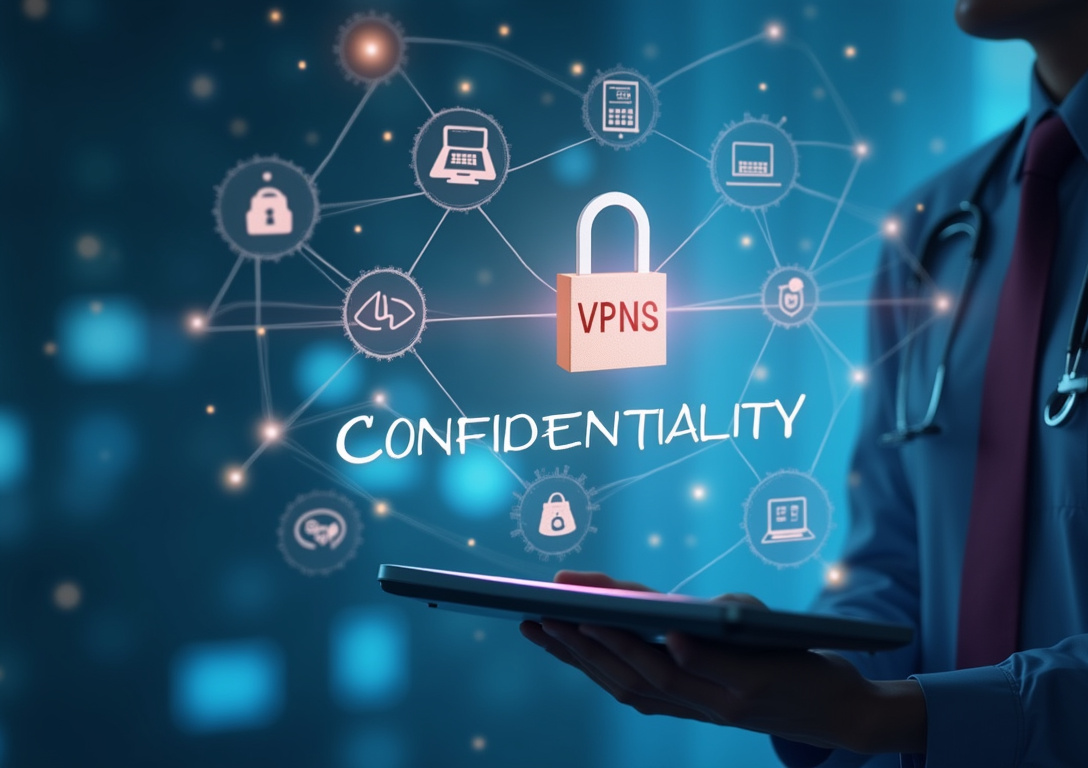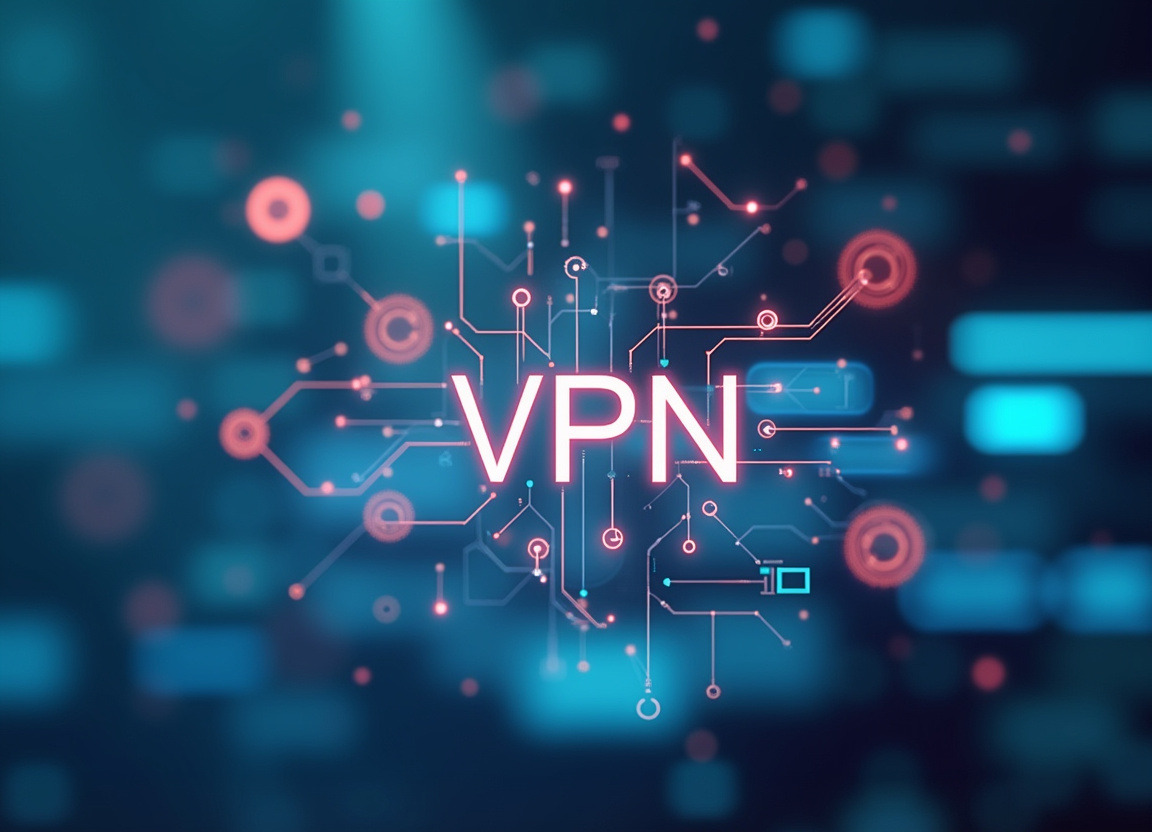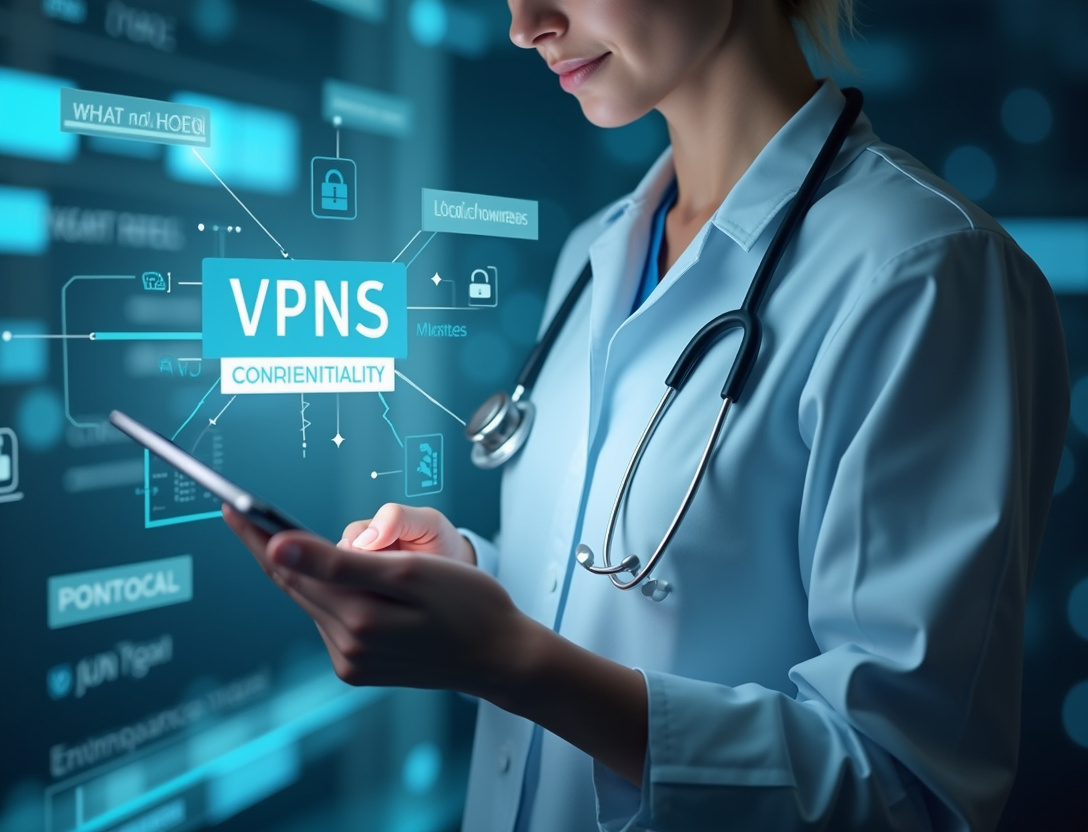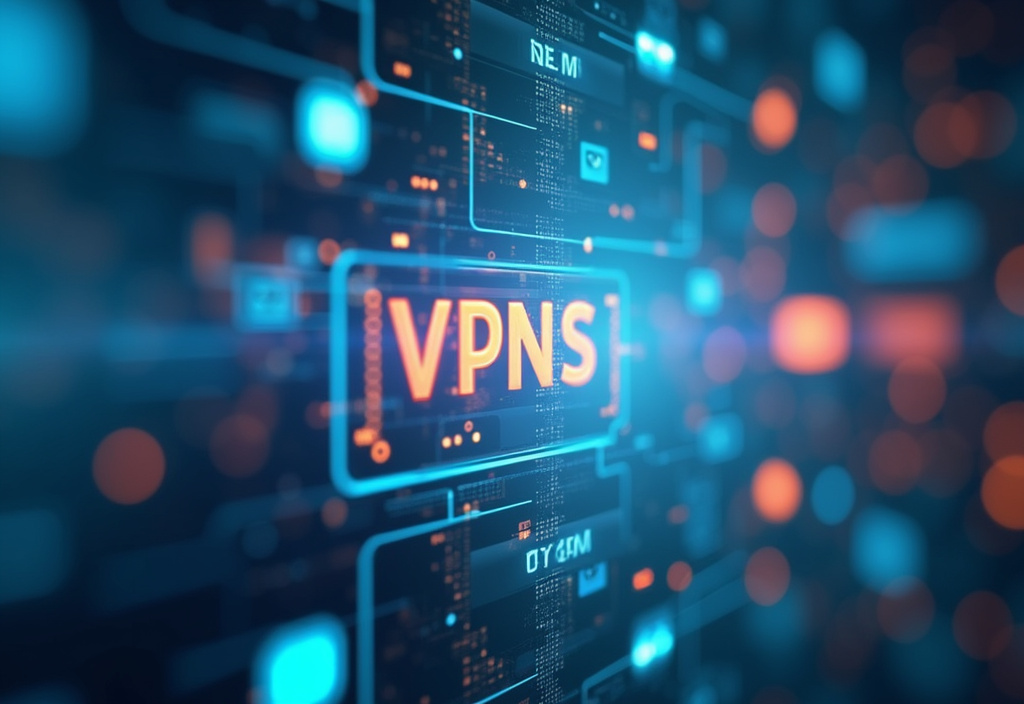VPNs for Smart Healthcare Devices: Ensuring Data Integrity

Table of Contents
VPNs for Smart Healthcare Devices: Ensuring Data Integrity
In an era defined by technological advancements, the healthcare industry has embraced smart devices to revolutionize patient care, enhance diagnostics, and optimize operations. From wearable fitness trackers that monitor vital signs to sophisticated medical implants that deliver life-saving treatments, these interconnected devices generate and transmit vast amounts of sensitive patient data. This increased reliance on technology, however, has also created significant vulnerabilities, making smart healthcare devices prime targets for cyberattacks that can compromise patient data, disrupt critical healthcare services, and even endanger patient lives.
As such, implementing robust security measures is no longer a luxury but an absolute necessity for healthcare providers to safeguard the privacy and well-being of their patients. Among the various security solutions available, Virtual Private Networks (VPNs) stand out as a powerful tool for securing smart healthcare devices and ensuring the integrity of patient data. A acts as a digital shield, creating a secure, encrypted tunnel for data transmission, effectively protecting sensitive patient information from unauthorized access and potential interception.
This article will serve as a comprehensive guide to understanding the critical role of VPNs in securing smart healthcare devices. We will explore different types of VPNs suitable for healthcare environments, delve into best practices for VPN implementation and management, and highlight the importance of VPNs in maintaining data integrity and ensuring within the ever-evolving healthcare ecosystem. The very foundation of patient data integrity rests on the assurance that information remains accurate, complete, and unaltered from its point of creation to its ultimate use in diagnosis, treatment, and care.
In the context of smart healthcare devices, this means that the data collected from wearable sensors, transmitted wirelessly across networks, and stored in patient databases must be protected against unauthorized modification, deletion, or corruption. A single instance of data compromise can have far-reaching consequences, leading to misdiagnosis, inappropriate treatment plans, and ultimately, compromised patient safety. A plays a pivotal role in ensuring this integrity.
By encrypting data as it travels across potentially vulnerable networks, the VPN effectively prevents malicious actors from intercepting and tampering with sensitive patient information. Moreover, a robust VPN solution provides by incorporating advanced security protocols, such as hashing algorithms and digital signatures, which verify the authenticity and completeness of data packets. This ensures that only authorized personnel can access and modify sensitive information, and any attempt to alter the data will be immediately detected.
Furthermore, a properly implemented not only encrypts data in transit but also provides a secure connection between the smart devices and the healthcare network, minimizing the risk of unauthorized access and preventing malicious software from infiltrating the system. This is particularly important for remote patient monitoring systems and other devices that communicate wirelessly, as these devices are often more vulnerable to security breaches. By securing the communication channels and implementing robust authentication protocols, VPNs help to maintain a secure perimeter around the healthcare network, preventing unauthorized access and protecting patient data from internal and external threats.
In an era where cybersecurity threats are constantly evolving and becoming increasingly sophisticated, the implementation of VPNs is an essential component of a comprehensive security strategy for smart healthcare devices. By prioritizing the implementation of VPNs and adhering to best practices for security management, healthcare organizations can significantly minimize the risk of data breaches, protect patient privacy, and ensure the integrity of their digital healthcare systems. This proactive approach not only safeguards patient data but also fosters trust, confidence, and the continued adoption of innovative healthcare technologies.
This commitment to security is paramount to ensuring that technological advancements in healthcare truly benefit patients and improve the quality of care.
device security
The pervasive integration of Internet of Things (IoT) devices into modern healthcare environments has ushered in an unprecedented level of interconnectedness, yielding both remarkable opportunities and formidable security challenges. From the intricately programmed smart insulin pumps that meticulously regulate blood sugar levels to the advanced remote patient monitoring systems that continuously track vital signs, and extending to the connected and high-resolution imaging equipment that provides critical diagnostic insights and the secure electronic health record (EHR) systems that house comprehensive patient histories, these ubiquitous devices generate an unceasing stream of extraordinarily sensitive patient data. The protection of this ever-flowing river of information from unauthorized access and the ever-present threat of malicious cyberattacks is of paramount importance.
Without a solid foundation of stringent , these ubiquitous vulnerabilities can be readily exploited by malicious actors with nefarious intent, including those seeking to pilfer patient data for financial gain, disrupt essential healthcare operations for ideological purposes, or even, in the most egregious cases, manipulate the inner workings of medical devices to directly cause harm to unsuspecting patients. This alarming reality necessitates a proactive, comprehensive, and multifaceted approach to security that places the utmost emphasis on safeguarding patient privacy and ensuring the unyielding integrity of every medical device within the network's embrace. At the core of a resilient and fortified healthcare IoT ecosystem lies the fundamental principle of implementing a multi-layered security strategy, a defensive architecture meticulously designed to address identified vulnerabilities at every conceivable level of the intricate network.
This approach extends far beyond simply installing antivirus software and hoping for the best, instead encompassing a series of interwoven security measures designed to complement and reinforce one another. These steps include thoroughly hardening the individual devices themselves through the implementation of robust and complex passwords, the routine application of timely software updates to patch known security flaws, and the deployment of sophisticated intrusion detection systems to identify and respond to suspicious activity in real time. Simultaneously, a robust multi-layered approach demands the implementation of equally robust network security measures, such as strategically placed firewalls to control network traffic, advanced intrusion prevention systems to proactively block malicious attacks, and, crucially, thoughtfully configured .
A well-designed and meticulously managed smart healthcare VPN assumes a pivotal role within this multi-layered defensive strategy, serving as a highly secure and encrypted tunnel for all data transmissions flowing between connected smart devices and the protected bastions of healthcare networks. This impenetrable digital conduit effectively shields sensitive patient information from the prying eyes of potential eavesdroppers and unauthorized access attempts, ensuring that confidential data remains confidential. Going beyond simple data encryption, a robust VPN solution offers a rich tapestry of additional security features that can further bolster the overall protection afforded to smart healthcare devices, adding layers of defense in depth.
These advanced features include robust authentication protocols, such as multi-factor authentication, to rigorously verify the identity of users and devices seeking access to the network; granular access controls, which meticulously restrict user and device privileges based on the principle of least privilege, granting access only to the specific resources required to perform assigned tasks; and sophisticated data integrity checks, which employ cryptographic hash functions to ensure that data remains unaltered during transmission and storage. These measures work in concert to ensure that only authorized devices and users can access the network and that data remains protected from unauthorized exfiltration, tampering, or corruption, even in the face of increasingly sophisticated cyberattacks. As the threat landscape continues to evolve, healthcare organizations must constantly adapt their security strategies to stay one step ahead of potential attackers.
Furthermore, by intelligently configuring the VPN, administrators gain the power to exert granular control over network traffic flow. This enables the strategic segmentation of the network, dividing it into smaller, more manageable units, and restricting access to particular devices or services based on carefully defined need-to-know principles. This critical function minimizes the overall attack surface of the network, reducing the potential impact and blast radius of a successful security breach.
For example, telemetry data from continuous glucose monitors can be segmented into a specific network only accessible to authorized diabetes management specialists and the patient. This level of isolation helps to contain breaches and prevent them from spreading to other sensitive parts of the healthcare network. By diligently prioritizing and implementing robust security measures, healthcare organizations can establish a more secure and reliable ecosystem for the delivery of patient care, fostering an environment of trust and confidence in the rapidly evolving landscape of smart healthcare devices.
patient data protection
Protecting is fundamentally more than just meeting regulatory demands; it represents a core ethical imperative incumbent upon all healthcare providers. The Health Insurance Portability and Accountability Act (HIPAA) within the United States, alongside similar data protection laws such as GDPR in Europe and comparable regulations across the globe, collectively mandate that healthcare organizations weave into the very fabric of their operations stringent security measures explicitly designed to relentlessly safeguard patient data against all forms of unauthorized access, impermissible usage, or unwarranted disclosure. Failure to rigorously adhere to these exacting regulations can swiftly result in significant financial penalties, inflicting substantial and lasting reputational damage, and causing an erosion of patient trust that can be difficult, if not impossible, to fully recover.
Beyond the realm of mere regulatory compliance, the profound importance of safeguarding patient data directly underpins the integrity of the entire healthcare system, playing an indispensable role in ensuring the consistent delivery of high-quality and ethical care. Patients entrust their healthcare providers with the safekeeping of their most sensitive medical information, expecting confidentiality and security as fundamental rights, and any violation of this deeply held trust can have devastating consequences, both for individual patients and for the broader healthcare ecosystem. The implementation of a , therefore, serves as a cornerstone of compliance with HIPAA and other data privacy regulations, providing a crucial layer of security that helps organizations meet their legal and ethical obligations.
A properly configured VPN encrypts all data transmitted between smart healthcare devices and the healthcare network, rendering it unreadable to unauthorized parties and protecting it from interception or tampering. This is particularly important for mobile devices and remote patient monitoring systems, which often transmit data over unsecured wireless networks. By using a VPN to create a secure connection, healthcare providers can ensure that patient data remains confidential, even when it is transmitted outside of the controlled environment of the healthcare facility.
Moreover, VPNs can help healthcare organizations meet the HIPAA requirement for access controls by restricting access to patient data to authorized personnel only. By implementing strong authentication protocols, such as multi-factor authentication, and configuring granular access controls within the VPN, healthcare providers can ensure that only individuals with a legitimate need to access patient data are granted access, and that their access is limited to the specific data and functions required for their roles. This helps to prevent unauthorized access to patient data by employees who do not have a need to know, as well as to detect and prevent potential insider threats.
Beyond regulatory compliance and ethical considerations, the implementation of VPNs offers a range of practical benefits for healthcare organizations, improving efficiency, enhancing collaboration, and reducing costs. For example, VPNs can enable healthcare providers to securely access patient data from remote locations, allowing them to provide timely and effective care to patients who are unable to visit a healthcare facility in person. This can be particularly beneficial for patients in rural areas or those with chronic conditions that require ongoing monitoring and management.
Furthermore, VPNs can facilitate secure collaboration between healthcare providers, allowing them to share patient data and consult with each other remotely, improving the quality of care and reducing the need for unnecessary travel. This can be particularly important for complex cases that require the expertise of multiple specialists. Successful integration of technology into the existing healthcare infrastructure requires careful planning and a comprehensive understanding of the organization's specific security needs and regulatory requirements.
A phased approach is often recommended, starting with a pilot project to test the VPN solution in a limited environment before rolling it out to the entire organization. Throughout the implementation process, it is essential to provide comprehensive training to all staff members on the proper use of the VPN and the importance of data security. By prioritizing patient data protection and embracing VPN technology as an integral component of their security strategy, healthcare organizations can build a foundation of trust, enhance the quality of care, and thrive in the increasingly interconnected and data-driven world of modern medicine.
device security
Choosing the right VPN solution for a healthcare environment requires careful consideration of various factors, including the specific security needs of the organization, the types of smart healthcare devices being used, the regulatory requirements that must be met, and the technical expertise of the IT staff. Not all VPNs are created equal, and selecting a solution that is not well-suited to the healthcare environment can leave sensitive patient data vulnerable to attack. One of the first factors to consider is the level of security provided by the VPN.
Look for a VPN that uses strong encryption protocols, such as AES-256, and supports secure authentication methods, such as multi-factor authentication. The VPN should also offer features such as a kill switch, which automatically disconnects the internet connection if the VPN connection drops, and DNS leak protection, which prevents DNS queries from being sent outside of the VPN tunnel. These features help to ensure that patient data remains protected, even in the event of a technical glitch or security breach.
Another important factor to consider is the scalability of the VPN. As the healthcare organization grows and the number of smart healthcare devices increases, the VPN should be able to scale accordingly without sacrificing performance or security. Look for a VPN that offers flexible deployment options, such as cloud-based or on-premise solutions, and supports a variety of devices and operating systems.
This will allow the organization to adapt the VPN to its specific needs and ensure that all smart healthcare devices are properly protected. In the realm of , seamless integration with existing healthcare IT infrastructure is also a major consideration. The chosen solutions must be compatible with existing network hardware, software systems, and security protocols.
This helps minimize disruptions during implementation and ensures a consistent and unified security posture across the entire organization. Interoperability is key to avoiding conflicts and streamlining operations. The VPN should also be easy to manage and maintain.
Look for a VPN that offers a user-friendly interface and comprehensive documentation. The VPN should also provide regular security updates and patches to address any vulnerabilities that are discovered. Ideally, the VPN should offer centralized management capabilities, allowing the IT staff to monitor and configure the VPN from a single console.
This helps to simplify administration and reduce the risk of human error. It's also important to assess the logging and auditing capabilities of the VPN. The VPN should log all network traffic and security events, allowing the IT staff to monitor activity and identify potential security threats.
Log data should be securely stored and readily accessible for auditing purposes. This helps to demonstrate compliance with regulatory requirements and provides valuable insights into the organization's security posture. Before making a final decision, it is essential to conduct thorough testing and evaluation of potential VPN solutions.
This should include testing the VPN's performance, security, and usability. It's also important to assess the vendor's support and training resources. Choose a vendor that offers reliable technical support and provides comprehensive training materials.
Remember to carefully review the vendor's service level agreement (SLA) to ensure that it meets the organization's needs. The SLA should specify the vendor's uptime guarantee, response time for support requests, and other performance metrics. Selecting the right VPN is only the first step.
Proper configuration and ongoing management are critical to ensuring its effectiveness. After implementing the VPN, it is crucial to regularly monitor its performance and security, update security policies, and train employees on best practices for VPN use. Periodic security audits and penetration testing can help identify vulnerabilities and ensure that the VPN is configured correctly and updated with the latest security patches.
By making informed decisions about VPN selection and implementing robust security practices, healthcare organizations can significantly reduce the risk of data breaches and safeguard the privacy and confidentiality of their patients.
integrity assurance
The journey towards securing smart healthcare devices and ensuring is not a one-time event but an ongoing process that requires continuous monitoring, proactive adaptation, and a commitment to best practices in VPN implementation and management. Once a VPN solution has been carefully selected and deployed, it is crucial to establish robust monitoring systems to track its performance, identify potential security threats, and ensure that it is functioning as intended. This involves regularly reviewing VPN logs, analyzing network traffic patterns, and monitoring for any suspicious activity that may indicate a security breach.
Proactive monitoring allows healthcare organizations to detect and respond to security incidents quickly, minimizing the potential for data loss or disruption of services. In addition to monitoring the VPN itself, it is also important to regularly assess the security posture of the smart healthcare devices that are connected to the VPN. This includes performing vulnerability assessments, patching known security flaws, and ensuring that devices are configured according to security best practices.
Regularly updating security policies and procedures is also essential, as the threat landscape is constantly evolving and new vulnerabilities are being discovered all the time. Equally important is providing comprehensive training to all employees on the proper use of the VPN and the importance of data security. Employees should be educated about the risks of phishing attacks, malware, and other cyber threats, and they should be trained on how to identify and report suspicious activity.
They should also be instructed on how to properly configure and use the VPN on their devices, and they should be made aware of the organization's security policies and procedures. In line with best practices, organizations should also conduct regular security audits and penetration testing to identify vulnerabilities and ensure that the VPN is configured correctly and updated with the latest security patches. Security audits involve a comprehensive review of the organization's security policies, procedures, and controls, while penetration testing involves simulating real-world cyberattacks to identify weaknesses in the organization's defenses.
These assessments can help to identify potential security gaps and provide valuable insights into how to improve the organization's overall security posture. Beyond technical measures, it is also important to foster a culture of security within the organization. This involves promoting awareness of security risks, encouraging employees to report suspicious activity, and holding individuals accountable for their actions.
Creating a culture of security can help to prevent insider threats and ensure that all employees are actively participating in protecting patient data. Further, organizations must establish a clear incident response plan that outlines the steps to be taken in the event of a security breach. This plan should include procedures for containing the breach, recovering data, notifying affected individuals, and reporting the incident to regulatory agencies.
Regularly testing and updating the incident response plan is essential to ensure that it is effective and that the organization is prepared to respond to a security breach in a timely and efficient manner. In the long term, the successful integration of VPNs into ecosystems requires continuous effort and a commitment to innovation. Healthcare organizations should stay informed about the latest security threats and technologies, and they should be willing to adapt their security strategies as needed.
They should also actively participate in industry forums and collaborate with other organizations to share best practices and improve the overall security of the healthcare sector. By embracing a proactive and continuous approach to security, healthcare organizations can minimize the risk of data breaches, protect patient privacy, and ensure the integrity of their digital healthcare systems, fostering trust and confidence in the use of technology to improve patient care. The ultimate goal is to create a secure and reliable environment where healthcare providers can leverage the power of smart devices to deliver the best possible care, without compromising the privacy or security of their patients.
Stay Updated
Get the latest VPN news, tips, and exclusive deals to your inbox.




